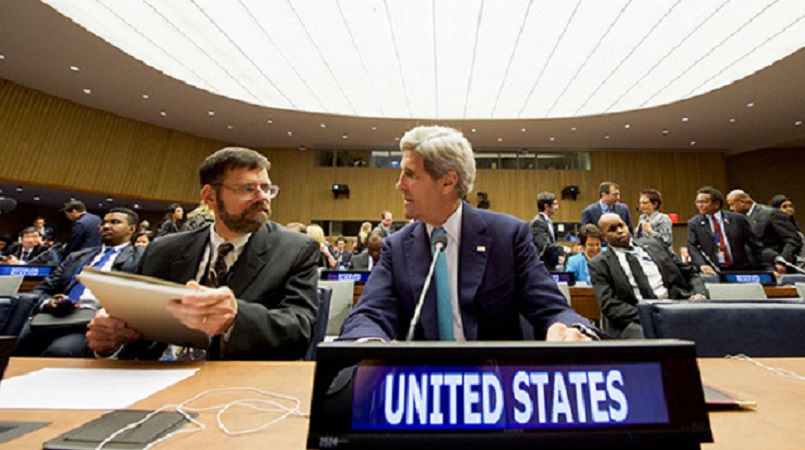
The State Department's new top climate official wants to deploy the alliance of nearly 100 nations that successfully demanded an aggressive deal in Paris last year outside the main U.N. global warming negotiations.
Jonathan Pershing, who took over the top post at the Office of the Special Envoy for Climate Change a few weeks ago, said the so-called high-ambition coalition that helped deliver December's accord could also inject ambition into negotiations over shipping and airline emissions.
An even bigger prize would be an amendment to the Montreal Protocol on Substances that Deplete the Ozone Layer aimed at phasing out heat-trapping hydrofluorocarbons (HFCs), Pershing said. Speaking at a briefing following Friday's signing of the Paris Agreement, he said an agreement on the Montreal Protocol would "be a big climate win" because HFCs contribute greatly to warming in the short term.
"In my mind, the question ultimately is, how do you keep the pressure on in all of these agreements to think about the climate benefits?" Pershing told ClimateWire.
"So if this group gets together and makes explicit that that value is there, that's what we want to do," he said. "This group brings that sense of urgency and commitment that's quite important."
Pershing spoke at an event hosted by the coalition, which emerged late in the Paris summit but was credited - along with small island states more broadly -- with winning the inclusion of an aspirational goal for limiting post-industrial warming to 1.5 degrees Celsius.
The coalition was spearheaded by then-Marshall Islands Foreign Minister Tony de Brum and included the European Union as well as other progressive island and Latin American nations. The United States and Brazil were later entrants.
About 30 members of the coalition met ahead of the signing, along with advocacy groups, supporters and former Vice President Al Gore, to mull future goals.
"Some people, including the United States and the European Union, think there is still a role for the coalition in moving forward beyond Paris," said de Brum.
For the time being, he added, the group will "keep the pressure on our partners to ratify quickly -- let's get the numbers up there - and then keep moving forward."
The trio of agenda items that Pershing mentioned -- shipping and aviation emissions and HFCs -- has long been on the administration's bucket list for climate change, and all could be concluded this year.
In bilateral agreements with China and other countries, Obama has sought agreement on an amendment to the treaty for ozone-depleting substances that would phase out heat-trapping chemicals used for cooling and refrigeration. The goal is now within reach -- and could become a reality in July, when parties to the Montreal Protocol hold an extra meeting in Vienna.
The International Maritime Organization met last week to consider - and reject - a work plan to develop carbon regulations for shipping. And while the United States and Canada have pledged to push the adoption of a market-based mechanism to cap the growth of emissions from the commercial aviation sector later this year, the issue has been contested by the industry. Negotiations are expected to culminate in September at the International Civil Aviation Organization's General Assembly meeting.
Pershing, who recently replaced former chief climate diplomat Todd Stern, said other priorities for his team during this final year of the Obama presidency would include encouraging other countries to quickly ratify and adopt the Paris deal, contributing to new rulemaking decisions for transparency and implementation of that deal, and providing technical help to countries as they formulate their climate action plans.
"Transparency really is one of the bedrocks of the agreement," he said, adding that those rulemakings will need to progress this year to be ready when the agreement comes online.
Pershing on Friday announced a new $15 million U.S. commitment to help poor countries develop their capacities on transparency.
The Paris Agreement includes binding requirements aimed at transparency that will eventually be applicable to all, though developing nations would have more time and flexibility to comply. But those rules have yet to be written, and the likelihood that the Paris deal could come online this year or next - years before the 2020 start date that was originally projected - means that negotiators must work fast this year to fill in the blanks.
Friday makes it very likely that the deal will take force early. The heads of state and foreign ministers who filled the halls of the U.N. headquarters spent the post-signing afternoon navigating a maze of hallways and security checkpoints that made some participants feel that the print of Pablo Picasso's "Guernica" adorning the second-floor lobby aptly reflected the chaos surrounding them.
The universal theme was how to help the Paris Agreement take effect and then build on that momentum.
Of the 196 parties that met in Paris last year, 175 sent heads of state or foreign secretaries to New York to sign the deal. It was the highest opening-day turnout for any U.N. agreement.
